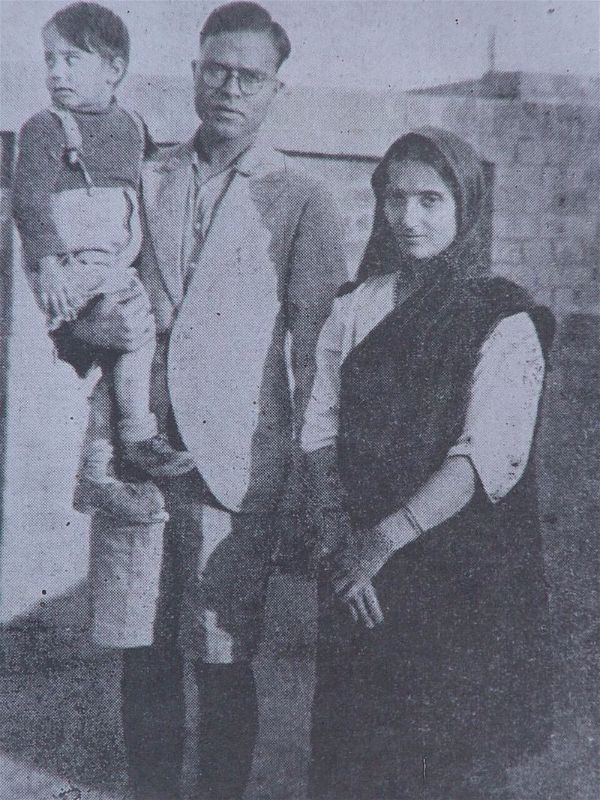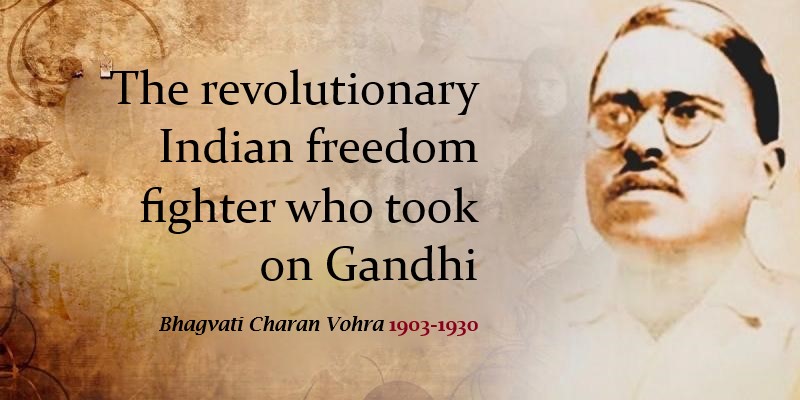Was Gandhian philosophy a compromise with the British? Yes! It is, said Bhagwati Charan Vohra, a Marxist communist revolutionary and a compatriot of Bhagat Singh in the Hindustan Socialist Republican Association (HSRA). He attained martyrdom on the 28th of May 1930.
Bhagwati Charan Vohra was born on the 15th of November 1903 in Lahore. His father, Shiv Charan Vohra, served as a senior railway official and received the ‘Rai Bahadur’ title for his loyal service to the British Raj. However, as Amristar raged in anger following the Jalianwala Bagh Massacre on the 13th of April 1919, Bhagwati Charan Vohra’s anti-British sentiments grew manifold.
In 1921, after passing his intermediate in science, Vohra joined the non-cooperation movement started by Gandhi. However, after the Chauri Chaura incident — where the police fired upon the protestors, and in retaliation, agitated demonstrators burned the police station killing 22 policemen — Gandhi called off the non-cooperation movement in February 1922. Vohra, like many others, gets disillusioned by the abrupt end to the agitation against the British. Soon after that, he joins the National College in Lahore to pursue his BA degree.
While studying in college, Bhagwati Charan Vohra gets influenced by communism, smuggles and distributes MN Roy edited journal ‘Vanguard’ and other Marxist literature. It is here that Vohra, Sukhdev, and Bhagat Singh initiate a study circle along the lines of the Russian socialist revolution to exchange and promulgate the ideas of communism to uplift the poor. Inspired by the success of the 1917 Russian revolution, they contemplate an armed struggle for freedom against the British.
In March 1926, when Bhagat Singh formed the revolutionary organization Naujawan Bharat Sabha, Bhagwati Charan Vohra gets designated as the propaganda secretary of NBS. Singh and Vohra prepare the moto of Naujawan Bharat Sabha, urging the youth of India to behold, “service, suffering, sacrifice,” as their resolve for independence.
In 1928, revolutionaries under the stewardship of Chandrashekar Azad reorganized Hindustan Republic Association into the Hindustan Socialist Republican Association (HSRA). Bhagwati Charan Vohra becomes the propaganda secretary and prepares the manifesto of HSRA. The manifesto stays as the vital ideological document of the association outlining its objectives.
In 1929, Bhagwati Charan Vohra used a rented room in Lahore to build a small bomb factory. He attempts to assassinate Viceroy Lord Irwin by planting a bomb on the Delhi-Agra railway line. However, Irwin escapes unhurt, and Gandhi thanks God for his escape and condemns the bombing in his article The Cult of Bomb.
In a sharp retort to Gandhi’s article, Bhagwati Charan Vohra co-authors a six-page response called ‘The Philosophy of Bomb.’
Excerpts from The Philosophy of Bomb: “There is no crime that Britan has not committed in India. Deliberate misrule has reduced us to paupers, and has ‘bled us white.’ As a race and a people, we stand dishonored and outraged. Do people still expect us to forget and to forgive? We shall have our revenge — a people’s righteous revenge on the tyrant. Let cowards fall back and cringe for compromise and peace. We ask not for mercy, and we give no quarter. Ours is a war to the end — to Victory or Death.”
On the 28th of May 1930, on the banks of the River Ravi, Bhagwati Charan Vohra gets severely wounded while testing a bomb and succumbs to it. Tearful comrades give him a hushed-up hurried burial on the banks, marking the abrupt end of a revolutionary who always said: “I want to die in such a place and manner that no one may know of it and shed tears.”

Bhagwati Charan Vohra was survived by his wife Durgawati Devi and son Sachindra Vohra. She stood by him right from the age of eleven, when they married. Fondly called by the comrades as Durga Bhabhi, she was one of the women faces of armed struggle in India against the British. She helped Bhagat Singh escape after the killing of John P Saunders and made a failed attempt to assassinate Lord Hailey, and served a jail term of three years. When Jatin Das died after his indefinite fasting in the jail, she marched the funeral procession from Lahore to Calcutta. Durga Bhabhi lived among us until October 1999, leading a quiet, anonymous life despite suffering and sacrificing much for the nation.

